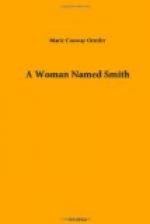“You don’t in the least look or write like a dehumanized saint, you know,” supplemented Alicia, laughing.
“What do I look like, then?” He sat on the edge of a table and cuddled a bony knee. Behind his glasses his eyes began to twinkle.
“You look more like yourself than you do like your photographs,” decided Alicia.
The Author threw up his hands.
“And now, tell me this, please: How, when, where, and from whom, did you acquire the supreme art of aiding and abetting an old house to grow young again without losing its character?”
“We were born,” Alicia explained, “with the inherent desire to do just what we have been able to do here. This house gave us our big chance. But it wouldn’t have been so—so in keeping with itself,” she was feeling for the right words, “if it hadn’t been for Mr. Nicholas Jelnik.”
The Author pricked up his intellectual ears. His eyes narrowed.
“Jelnik? I knew a Jelnik, an Austrian alienist; met him at dinner at the American Ambassador’s in Vienna; quiet, unassuming, pleasant man, and one of the greatest doctors in Europe.”
“Mr. Jelnik is Doctor Jelnik’s son.”
“What!” shrieked The Author. And with unfeigned amazement: “In the name of high heaven, what is Jelnik’s son doing here?”
“Mr. Jelnik’s mother was a Miss Hynds. She met and married your doctor abroad.”
That sixth sense possessed by him to an unusual degree, warned him that he was on the trail of Copy.
“May I ask questions?” he demanded.
“Of course.”
“You inherited this property from an old aunt, I believe?”
“She wasn’t my aunt, really. She married my mother’s uncle, Johnny Scarlett.”
“I see. And Jelnik’s mother was a Miss Hynds. How long has he been here?”
“For some time before we came.”
“Near neighbor of yours?”
“Yes,” Alicia put in; “and Doctor Richard Geddes is our neighbor on the other side. His grandmother was a Miss Hynds.”
“Pardon a writer-man’s curiosity,” begged The Author, smiling. “But this house is unusual, very unusual. While I am here I shall look up its history. It should make good copy.”
Having a pretty shrewd idea of The Author’s powers of finding out what he wanted to find out, we thought it better that he should hear that history, as we knew it. If the mystery had ever been solved, the tragedy of Hynds House would have had but passing interest for The Author. But the undiscovered piqued and puzzled him and aroused his combative egotism.
From the pictured face of Freeman—dark, stern, uncommunicative—he trotted back to the drawing room to look again at the boyish face of little Richard leaning against his pretty mother’s knees; at the haughty, handsome face of James Hampden; and at beautiful dark Jessamine, who had a long black curl straying across the shoulder of a blue frock, and a curled red lip, and a breast of snow.




